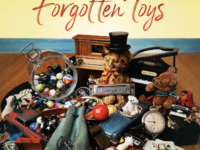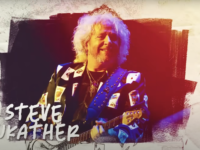Preston Frazier joins David Paich to discuss his debut solo EP ‘Forgotten Toys,’ as well as key deep cuts from his legendary Toto discography:
PRESTON FRAZIER: Congratulations on Forgotten Toys.
DAVID PAICH: I’m very excited about the release of Forgotten Toys, my first solo EP. It’s been a long time coming. These songs have rattled around in my treasure chest, and were waiting to be rediscovered.
PRESTON FRAZIER: When did you start the process of developing the project?
DAVID PAICH: I had pieces lying around. I had “Lucy,” a jazzy piece I wrote with Mike Lang about seven or eight years ago. We were going to do a jazz thing, but we both were busy. It was lying there, so I thought, ‘Why not put it on a solo thing?’ I thought it was indicative of me and how I like jazz. The rest came together in the last two years during the pandemic. My Toto bandmates, Steve Lukather and Joseph Williams, both got busy with solo records and urged me to get started.
PRESTON FRAZIER: You mentioned your collaboration with Mike Lang, who just passed. That song could have easily been the cornerstone for a David Paich jazz album.
DAVID PAICH: I wanted Forgotten Toys to be diverse and exciting, with no filler. This is the way I like albums – where there is a little surprise, in terms of style and playing. I also want it to still have groove going on. I think the seven cuts really work together.
PRESTON FRAZIER: Toto’s Old Is New album used tracks from prior demo sessions. Did you consider doing something similar for Forgotten Toys?
DAVID PAICH: Only one song dates back to about 2006. I started the riff for “All The Tears That Shine” right after Toto finished Falling in Between. I didn’t get to writing the song until about four years later with Michael Sherwood. I overdubbed the music, essentially something totally new, and crafted it to the guide vocal he did and used it for my album. It’s an outstanding performance vocally by Michael. We are honoring his passing by putting it on the album.
PRESTON FRAZIER: Joseph Williams steps up again to the production chair, as with Old Is New.
DAVID PAICH: Joseph and I have had writing chemistry for a while. He and I started collaborating on songs for Toto, and I saw how he would coproduce and engineer with Toto. He’s an excellent engineer, vocalist, and vocal arranger. I decided I wanted him along in the booth to listen objectively.
PRESTON FRAZIER: You have an impressive record as a producer, working with Boz Scaggs, Cheryl Lynn, and Lodgic [Billy Sherwood and Michael Sherwood band’s, produced with Steve Porcaro], among others. How was production changed?
DAVID PAICH: Technology! Now it’s all digital, making the editing process much more manageable. It gives so much freedom, which could also bog you down with too much choice. The technology is marvelous.
PRESTON FRAZIER: You utilize a new group of players, including Brian Eno and Davey Johnston [who sang on Toto’s Through the Looking Glass]. Of course, Lenny Castro and Steve Lukather also appear.
DAVID PAICH: Joseph and I cast certain players for each song before we started recording. We’ve been friends and played with all these guys for over 25 years. It was fun building the magical combination of players.
PRESTON FRAZIER: You could make different genre compilations from Toto’s catalog. An example is “Great Expectations,” which could be the cornerstone of a Toto prog-rock compilation. The new song “Forward” has a prog-rock feel, as well.
DAVID PAICH: I wanted “Forward” to show my cinematic side. My great friend James Newton Howard, not to mention Jerry Goldsmith and John Williams, all of whom I worked with, influenced me. I wanted to give a teaser of that side of me. Hopefully, I’ll explore that side a little more.
PRESTON FRAZIER: Then you hit the listener with “willibelongtoyou.”
DAVID PAICH: Joseph had a chorus on his computer. I heard this snippet, and I said, ‘I’d like to write a part to that.’ We connected the verse, and Chris and worked on the lyrics together.
PRESTON FRAZIER: You had Steve Lukather on lead guitar with Dean Parks on rhythm guitar, along with Toto alumni Nathan East and Greg Bissonette. You also handle to organ and piano. Did you use synth patches?
DAVID PAICH: Yes, I have a grand piano and a Hammond Organ but sometimes the synths work just as well. Also, having the real players give it a tremendous human feel.
PRESTON FRAZIER: You co-wrote “First Time” with Joseph Williams, too.
DAVID PAICH: Yes, I had this riff, then I wrote a chorus and a bridge. Joseph heard it and said, “That’s the first one we should start with.” He arranged it, put the demo blueprint together then we started the casting process.
PRESTON FRAZIER: Elizabeth Paich provides backing vocals.
DAVID PAICH: Yes, she does. The song touches on a daughter’s coming of age. The song is from a father’s point of view, hoping his daughter finds love. Elizabeth snuck into the studio, worked with the engineer, and recorded her part. Her part is wonderful.
PRESTON FRAZIER: “Spirit of the Moonlight” is a strong rocker.
DAVID PAICH: That came about when I and a piece of the chorus and the instrumental part. I came up with another verse; Joseph helped me put the form together. I had a reoccurring dream about a girl riding a painted horse. Joe jumped in, and we went back and forth on lines for the lyrics. Steve Lukather added a fantastic solo and fills. I added Michael McDonald’s vocals on choruses and fills at the end. It really makes it for me.
PRESTON FRAZIER: Yes! His vocals are similar to the contributions he made to Toto XIV. It’s great to hear you provide great rock lead vocals too, especially on “Queen Charade.”
DAVID PAICH: That’s one of my favorites because it’s a little cavalier and reckless. It’s got a Rolling Stones vibe to it. About four years ago, I got to work with them. Steve Jordon, the current Rolling Stones drummer, called me to play on Keith Richards’ album. That inspired me to write this song. I got Steve Jordon to play on it and brought in [former Eagles member] Don Felder to provide his signature slide guitar. Warren Ham also provides bluesy harmonica and sax.
PRESTON FRAZIER: Yes’ Billy Sherwood provides backing vocals on “All The Tears That Shine.”
DAVID PAICH: Yes, I reached out to him to see if he had any thoughts about doing a backing vocal. He provided the backgrounds on the last chorus and fills at the end too. It was very moving.
PRESTON FRAZIER: I have to ask about your collaboration with Billy Sherwood on the Kingdom of Desire album, “The Other Side.” Do you recall how that came about?
DAVID PAICH: That was my first time writing with Billy. Rory Kaplin also contributed to the song. We went to Nashville, and we’re having dinner with Rascal Flatts at their restaurant. At some point, they took out their guitars and sang “The Other Side.”
PRESTON FRAZIER: “Lucy” also features James Torme. How did he become involved?
DAVID PAICH: I met James while we were recording Falling In Between. I met his father, Mel Torme, when I was a kid as his father worked with my father, Marty Paich. I thought I’d bring James in since we’ve worked together before, and he is a pretty good scatter.
PRESTON FRAZIER: What do you recall about your involvement with the Doobie Brothers album Living on the Fault Line?
DAVID PAICH: Ted Templeman, their producer, heard some arrangements I had done, possibly Silk Degrees by Boz Scaggs, and wanted to collaborate. My father helped me with the album, bringing a classy, professional feel to the string and horn writing. I’m glad you brought that up.
PRESTON FRAZIER: Tell us more about the song “Stranger in Town” from Toto’s Isolation.
DAVID PAICH: I wanted to write a song similar to what John Lennon had done when he found topics in the newspaper. I was leaving London for L.A. when I had forgotten my passport and then went back to the hotel to get it. I missed the flight and was rerouted. When on the plane, I used a newspaper and circled topics to create a narrative. Then I came up with the riff for the song.
PRESTON FRAZIER: One of my favorites is “Chinatown” from Toto XIV.
DAVID PAICH: I have a cousin who lived in Oakland, Calif. We use to hang out down by Boz’s club and in Chinatown. I got drawn in by the mystery of the gangs which were there and the murky San Francisco underground. I wrote it back in 1978. I had a verse and chorus, but it wasn’t finished. Mike Sherwood came in years later and moved the song forward.
PRESTON FRAZIER: Tell me about one of my favorites from Isolation, “Carmen.”
DAVID PAICH: My wife’s mother suggested the subject. She was an opera singer who suggested turning [Georges Bizet’s opera] Carmen into a rock song. I listened to the opera and started writing a narrative. After we’d just finished the Toto IV album, I heard “Shock the Monkey” by Peter Gabriel, and it made me feel a certain way. I wanted to get this rolling bass sound happening so I incorporated a “Shock the Monkey” feel with the narrative of Carmen on top of it. The rest is me trying to give it its own life.
PRESTON FRAZIER: Finally, let’s talk about the last song from Toto XIV, “Great Expectations.”
DAVID PAICH: That song comes from pieces I already had. I had an intro from back when we did the Turn Back album. The parts after it weren’t just right. I was in Europe and different musical ideas were coming to me, so I sang them into my wife’s phone. The intro, verse and chorus all came that way. Steve Lukather provided the guitar solo section and Joseph came in, and we wrote the lyrics together. We wanted to do a long extended work like our heroes, Yes. We wanted to perform it live too, and we did – though it’s quite challenging.
PRESTON FRAZIER: Thanks for the insight into Forgotten Toys.
DAVID PAICH: Thank you, and all the Toto fans. We are grateful for their loyal support – as am I, over all these years. Bless you all!
- These Moments Still Stand Out on ‘Toto XIV’ - March 20, 2025
- Fernando Perdomo – ‘Waves 3’ (2025) - March 13, 2025
- Deborah Holland – ‘I Made It This Far’ (2025) - March 7, 2025




